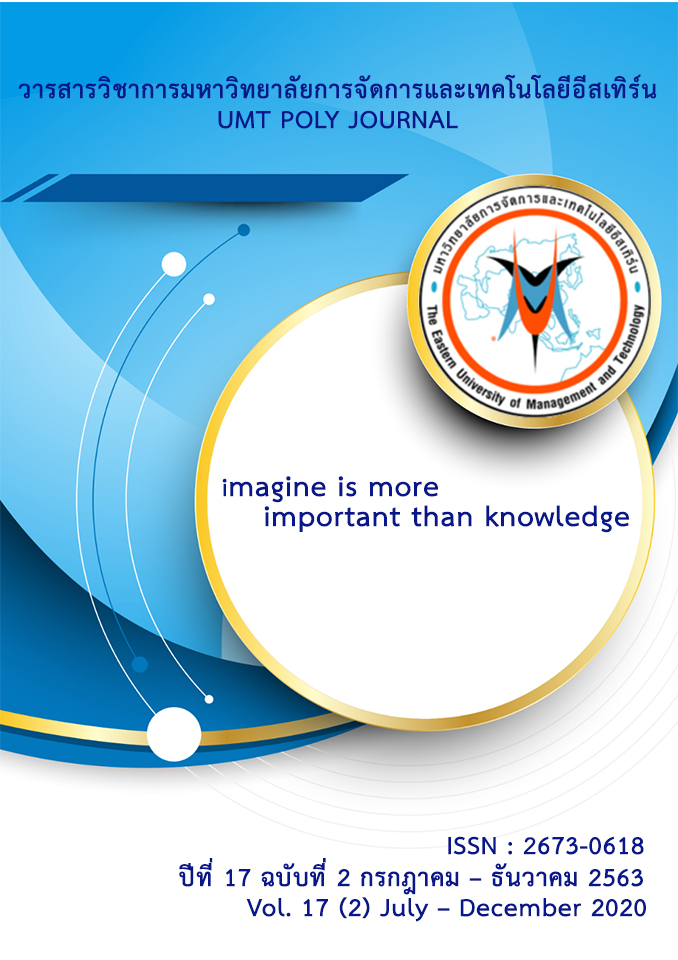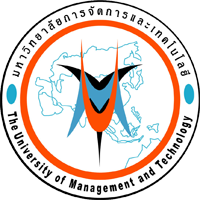A study of the relationships between adaptive leadership and effectiveness of the administration schools of office the basic education commission
Keywords:
Leadership, Adaptive Leadership, Effectiveness of the Schools, Office the Basic Education commissionAbstract
The purposes of this research were to study 1) the adaptive leadership of school principal of office basic education commission 2) the effectiveness of the administration school of office basic education commission 3) the relationship between adaptive leadership and the effectiveness of the administration school of office basic education commission. the sample of this research consisted of 397 the teacher of office basic education commission. The research instrument used for collecting data was a rating scale questionnaire. The statistics used included percentage, mean, standard deviation and Pearson product moment correlation.
The results of the research were as follows: 1.) Average mean of the adaptive leadership of school principal of office basic education commission was high level. 2.) Average mean of the effectiveness of the administration school of office basic education commission was high level. 3.) The relationship between the relationship between adaptive leadership and the effectiveness of the administration school of office basic education commission was statistically significant at .01 level.
Downloads
References
ธร สุนทรายุทธ. (2551). การบริหารจัดการเชิงปฏิรูป : ทฤษฏี วิจัย และปฏิบัติการทางการศึกษา. กรุงเทพฯ: เนติกุลการพิมพ์.
นฤมล บุญพิมพ์. (2553). ความสัมพันธ์ระหว่างความเป็นองค์การแห่งการเรียนรู้ในโรงเรียนกับประสิทธิผลการบริหารงานในโรงเรียน สังกัดสำนักงานเขตพื้นที่การศึกษากาญจนบุรี. วิทยานิพนธ์ครุศาสตรมหาบัณฑิต, มหาวิทยาลัยราชภัฏกาญจนบุรี.
นวรัตน์วดี ชินอัครวัฒน์ และสุวัฒน์ จุลสุวรรณ์. (2562). การวิเคราะห์องค์ประกอบเชิงยืนยันภาวะผู้นำการปรับเปลี่ยนของหัวหน้ากลุ่มสาระการเรียนรู้ ในโรงเรียนมัธยมศึกษา สังกัดสำนักงานคณะกรรมการการศึกษาขั้นพื้นฐาน. วารสารหาดใหญ่วิชาการ,17(2), 180-199.
นุชรินทร์ เสมอโภค. (2558). ความสัมพันธ์ระหว่างความเป็นองค์กรแห่งการเรียนรู้กับประสิทธิผลของโรงเรียน สังกัดสำนักงานเขตพื้นที่การศึกษาประถมศึกษาร้อยเอ็ด เขต 3. วิทยานิพนธ์ครุศาสตรมหาบัณฑิต, มหาวิทยาลัยราชภัฏร้อยเอ็ด.
พรวิภา สุขศรีเมือง. (2557).ความสัมพันธ์ระหว่างองค์การแห่งการเรียนรู้กับประสิทธิผลของโรงเรียน สังกัดสำนักงานเขตพื้นที่การศึกษาประถมศึกษานครศรีธรรมราช เขต 3. วิทยานิพนธ์ครุศาสตรมหาบัณฑิต, มหาวิทยาลัยราชภัฏนครศรีธรรมราช.
มาลี ธรรมศิริ. (2543). การพัฒนารูปแบบองค์การแห่งการเรียนรู้โดยฝ่ายหน่วยพัฒนาทรัพยากรมนุษย์ในฐานะส่วนขยายของการอุดมศึกษา. วิทยานิพนธ์ครุศาสตรดุษฎีบัณฑิต, จุฬาลงกรณ์มหาวิทยาลัย.
วันชัย นพรัตน์. (2540). ภาวะผู้นำของผู้บริหารโรงเรียนที่สัมพันธ์กับประสิทธิผลของโรงเรียนประถมศึกษา สังกัดสำนักงานคณะกรรมการการประถมศึกษาแห่งชาติในเขตการศึกษา 12.ปริญญานิพนธ์การศึกษามหาบัณฑิต, มหาวิทยาลัยบูรพา.
วิจารณ์ พานิช. (2555). วิถีสร้างการเรียนรู้เพื่อศิษย์ในศตวรรษที่ 21. กรุงเทพฯ: มูลนิธิสดศรี- สฤษดิ์วงศ์.
สันติ ชัยชนะ. (2557). ตัวบ่งชี้ภาวะผู้นำการปรับเปลี่ยนสำหรับผู้บริหารสถานศึกษาขั้นพื้นฐาน. วิทยานิพนธ์ปริญญาดุษฎีบัณฑิต, มหาวิทยาลัยขอนแก่น.
สุรชัย ช่วยเกิด. (2547). คุณลักษณะของผู้บริหารและวัฒนธรรมโรงเรียนที่เกี่ยวกับประสิทธิผลของโรงเรียนภายใต้การบริหารโดยใช้โรงเรียนเป็นฐาน. ปริญญานิพนธ์วิทยาศาสตร์มหาบัณฑิต, มหาวิทยาลัยศรีนครินทรวิโรฒ ประสานมิตร.
สุวัฒน์ จุลสุวรรณ์. (2561). ปัจจัยองค์กรแห่งการเรียนรู้ที่ส่งผลต่อประสิทธิผลของสถานศึกษาสังกัดสำนักงานเขตพื้นที่การศึกษาประถมศึกษาภาคตะวันออกเฉียงเหนือ. วารสารบัวบัณฑิต.18(3), 342-354.
Cojocar, B. (2009). Adaptive leadership: Leadership theory or theoretical derivative?.Journal of Academic Leadership, 7(1), 1-7.
Glover, Jerry; Rainwater, Kelley; Jones, Gordon; Friedman, Harris (2002).Adaptive leadership (Part Two): Four principles for being adaptive. Organization DevelopmentJournal, 20(4), 18-38.
Heifetz, R. A., Linsky, M., &Grashow, A. (2009).The practice of adaptive leadership: Tools and tactics for changing your organization and the world. Cambridge: Harvard.
Hogan, T. J. (2008). The adaptive leadership maturity model.Organization Development Journal, 26(1), 55-61.
Hoy, W.K., &Miskel, C.G. (1991). Education at Administration : Theory, Research and Practice. 4th ed. Singapore: McGraw-Hill.
Kay, K. (2010). 21st Century Skills: Why the Matter, What They are, and How We Get There. In Bellanca, J. & Brandt, R. (Eds.), 21st Century Skills: Rethinking How Students Learn. Bloomington, In: Solution Tree Press.
Krejice& Morgan, T. (1970).Determining Sampling Size for Research Activities.Educational and Psychological Measurement, 30(3), 597-710.
Martin, J. (2010). The Meaning of the 21st Century. Bangkok. L. T. P. The Partnership for 21st Century Skill.(2009). Framework for 21st Century Learning.Retrieved June 5, 2018, from http://21st Century skill. Org/index.php.
Mott, Paul E. (1972). The Charactristies of Efficient Organization. New York: Harpe and Row.
Sims, Bryan D. (2009). Complexity, Adaptive Leadership, Phase Transitions and New emergent order: A case study of the Northwest Texas Conference of the United Methodist church. U.S.A.: School of Global Leadership &Entrepreneurship Regent University.
Thomas, R. J. (2008). Crucibles of leadership: How to learn from experience to become a great leader. Boston: Harvard Business Press.
Yukl , G., &Lepsinger, R. (2008). Why Flexible, Adaptive Leadership, is Essential for Organizational Effectiveness. U.S.A.: University of Albany (SUNY).
Yukl, G. A. (2002). Leadership in organizations. (5th ed.) Upper Saddle River, New Jersey: Prentice Hall.
Yukl, G., &Mahsud, R. (2010).Why flexible and adaptive leadership is essential. Consulting Psychology Journal: Practice and Research, 62(2), 81-93.
Downloads
Published
Issue
Section
License
ประกาศลิขสิทธิ์
เนื้อหาและข้อมูลในบทความที่ลงตีพิมพ์ในวารสารวิชาการมหาวิทยาลัยการจัดการและเทคโนโลยีอีสเทิร์น ถือเป็นข้อคิดเห็นและความรับผิดชอบของผู้เขียนบทความโดยตรง ซึ่งกองบรรณาธิการวารสารไม่จำเป็นต้องเห็นด้วยหรือร่วมรับผิดชอบใด ๆ
บทความ ข้อมูล เนื้อหาหรือรูปภาพ ฯลฯ ที่ได้รับการตีพิมพ์ในวารสารวิชาการมหาวิทยาลัยการจัดการและเทคโนโลยีอีสเทิร์น ถือเป็นลิขสิทธิ์ของวารสารวิชาการมหาวิทยาลัยการจัดการและเทคโนโลยีอีสเทิร์น หากบุคคลหรือหน่วยงานใดต้องการนำข้อมูลทั้งหมดหรือบางส่วนไปเผยแพร่ต่อหรือเพื่อกระทำการใด ๆ จะต้องได้รับอนุญาตเป็นลายลักษณ์อักษรจากวารสารวิชาการมหาวิทยาลัยการจัดการและเทคโนโลยีอีสเทิร์นก่อนเท่านั้น




